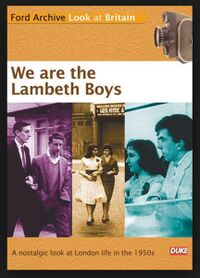We Are The Lambeth Boys: Difference between revisions
No edit summary |
No edit summary |
||
| (One intermediate revision by the same user not shown) | |||
| Line 1: | Line 1: | ||
[[Category:Influences on Morrissey - Film and Television]] | |||
[[File:We Are The Lambeth Boys poster.jpg | 200px | right | thumb |We Are The Lambeth Boys poster]] | |||
==Relevance== | ==Relevance== | ||
Excerpt from the [https://en.wikipedia.org/wiki/Spring-Heeled_Jim Spring-Heeled Jim Wikipedia entry]: | |||
<blockquote> | |||
The song features several samples from [[Mention::We Are The Lambeth Boys|We Are the Lambeth Boys]], a 1959 British documentary by Karel Reisz about the daily activities of members of the Alford House Youth Club, Kennington in late 1950s London. The dialogue excerpted is from two conversations, one about a fight between two groups of young men and another about the abolition of the death penalty. | |||
</blockquote> | |||
* Film available for viewing / download at archive.org: https://archive.org/details/WeAreTheLambethBoys. | |||
{{Page | {{Page | ||
|WikipediaPageTitle=We_Are_the_Lambeth_Boys | |WikipediaPageTitle=We_Are_the_Lambeth_Boys | ||
}} | }} | ||
Latest revision as of 22:15, 18 February 2023
Relevance
Excerpt from the Spring-Heeled Jim Wikipedia entry:
The song features several samples from We Are the Lambeth Boys, a 1959 British documentary by Karel Reisz about the daily activities of members of the Alford House Youth Club, Kennington in late 1950s London. The dialogue excerpted is from two conversations, one about a fight between two groups of young men and another about the abolition of the death penalty.
- Film available for viewing / download at archive.org: https://archive.org/details/WeAreTheLambethBoys.
Mentioned In
Wikipedia Information
 |
We Are the Lambeth Boys is a 1959 British documentary film directed by Karel Reisz. Filmed in the summer of 1958, it was sponsored by the Ford motor company as part of a 'Look at Britain' series. Lambeth Boys was one of the last films to be made by the Free Cinema movement, and offered a sympathetic portrait of the lives of young working-class people in South London.
